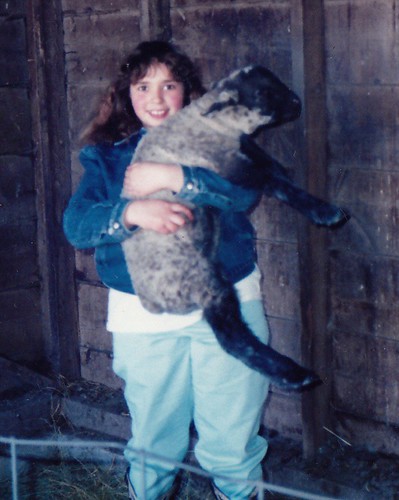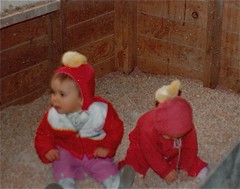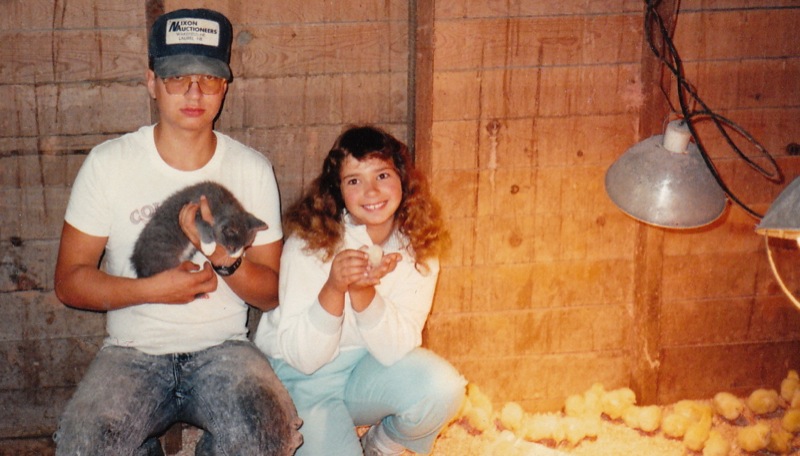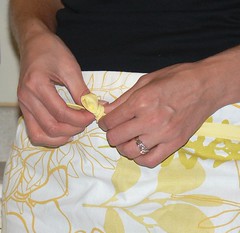 I don't really like meat. Never have. In other families such disinclination might be unremarkable, or even encouraged, but my people are salt of the earth meat-and-potato sorts who butcher their own beasts, make their own sausage and celebrate birthdays and anniversaries and other occasions of note with chislic (see Blackie, pictured above) feeds and prime rib. I could go on, but suffice it to say that my family really likes a good steak or pork loin or duck or even a crawdad feed. So I've worked hard to hide the fact that I don't -- disguising a paltry portion of Thanksgiving turkey behind heaps of mashed potatoes, sweet potatoes, or, God willing, a nice big serving of pretzel salad and nibbling around the well-done edge of my piece of prime rib.
I don't really like meat. Never have. In other families such disinclination might be unremarkable, or even encouraged, but my people are salt of the earth meat-and-potato sorts who butcher their own beasts, make their own sausage and celebrate birthdays and anniversaries and other occasions of note with chislic (see Blackie, pictured above) feeds and prime rib. I could go on, but suffice it to say that my family really likes a good steak or pork loin or duck or even a crawdad feed. So I've worked hard to hide the fact that I don't -- disguising a paltry portion of Thanksgiving turkey behind heaps of mashed potatoes, sweet potatoes, or, God willing, a nice big serving of pretzel salad and nibbling around the well-done edge of my piece of prime rib.Even so, I'm sure I never fooled anyone, and my mother is the only one who still harangues me about this particular failing, though it's more focused on whether I cook enough meat for J. (My grandma is just concerned that I cook enough for him, period). He's thin, you see, and there's nothing that triggers their save-the-world-one-good-meal-at-a-time instincts like a skinny man. I'd like to point out, though, that I'm not the only one in the family with meat "issues:" One of my cousins won't eat seafood because the ocean creeps her out. And there's the uncle who refuses to eat chicken or anything else that was once feathered.
For the record, I do eat meat, albeit irregularly, and sometimes I really do crave a steak, but mostly it's pork chops or white meat chicken, though I was in high school before I'd even attempt that much.
 I had an intimate familiarity with the lifecycle of that fair bird, you see, and once the mystery is gone, well, it's just gone, though you have to understand that I was a particularly sensitive and squeamish child. Squeamish children don't do well with blood and guts no matter how much they want to be like Laura Ingalls and her enterprising ma making head cheese over an open fire. (Check out these brave little Laura scholars).
I had an intimate familiarity with the lifecycle of that fair bird, you see, and once the mystery is gone, well, it's just gone, though you have to understand that I was a particularly sensitive and squeamish child. Squeamish children don't do well with blood and guts no matter how much they want to be like Laura Ingalls and her enterprising ma making head cheese over an open fire. (Check out these brave little Laura scholars).The whole thing got started in spring when grandma ordered her chicks.
 They arrived in the mail a few weeks later, all whisper soft and warm and peeping to settle in under the heat lamps in the brooder house, where they passed an awkward half-chick half-chicken adolescence with feathers gradually taking the place of down until they were mature and clucking and ready to butcher, about six to nine weeks later.
They arrived in the mail a few weeks later, all whisper soft and warm and peeping to settle in under the heat lamps in the brooder house, where they passed an awkward half-chick half-chicken adolescence with feathers gradually taking the place of down until they were mature and clucking and ready to butcher, about six to nine weeks later.At this point, friends, grandma called together the girls, usually my mom and assorted aunts and cousins, for a butchering. I always tried to find something to play that would keep me out of sight and mind, but my mom was not so easily foiled and she was big on having me help ( I think she wanted to work that squeamishness right out of me). Part of the crew set up a propane burner in the quonset to start some water boiling. Grandma, meanwhile, slit throats out behind the brooder house and then released the chickens to flap, headless, through the weeds. One of my jobs, as I recall, was to watch where they finally flopped still and then dart through the now blood-smeared weeds to collect the carcasses.
From there they were taken to the quonset for processing. First step, plucking: We gathered around the propane burner on upturned 5-gallon buckets, newspapers spread out on the floor to catch the feathers, but first the carcass had to be swirled through the boiling water to soften the feathers. I was supposed to help pluck, but I didn't like touching the wet, warm feathers -- or the smell -- and so I did a pretty poor job of it. While I still suffer some residual guilt from that, truth be told -- I wouldn't change a thing. After the chickens were laid bare, grandma inspected them, lighter in hand, for stray barbs or any other undesirables that might need to be scorched off. That smelled awesome, too.
Then they were gutted. Again, I was supposed to help with this, but I could not stand even the thought of sticking my hands into the mysterious slippery innards of a chicken carcass, so mostly I watched. If there had been gloves, I might have done it, but requests for said gloves were dismissed as ridiculous. Besides, my cousin Heidi had no problem with the task, and that's why she's now a traveling nurse who's seen the world and I'm just a lowly humanities major turned journalist stuck at a desk all day. True, true. But the thing I remember most about this step was that grandma slit open the gizzard to empty out the chicken's last meal. It was fascinating, but sad, really; they didn't even have time to digest. She didn't save them, though; grandpa wasn't big on gizzards.
The carcasses got rinsed out, I think, and then frozen, with a few left out for eating fresh.
Blech.
To be clear, I'm not claiming this was some sort of traumatizing or even disillusioning experience. I had -- and have -- no moral or ethical objects to meat in theory. I grew up on a farm, and I knew what happened to Midnight the prize-winning sow when she didn't come home from achievement days.
 In fact, I rode along with dad to take her to the locker in Freeman. And I knew why she had to go -- you didn't bring home pigs that could have been exposed to Lord knows what at the county fair, even in the name of 4-H State Fair. I'm just saying that I didn't like meat and being intimately familiar with how it went from coop to plate gave me yet another reason to be persnickety about the whole business.
In fact, I rode along with dad to take her to the locker in Freeman. And I knew why she had to go -- you didn't bring home pigs that could have been exposed to Lord knows what at the county fair, even in the name of 4-H State Fair. I'm just saying that I didn't like meat and being intimately familiar with how it went from coop to plate gave me yet another reason to be persnickety about the whole business. But then I took philosophy in pursuit of a liberal arts education and the professor made us watch some video about factory farming.
But then I took philosophy in pursuit of a liberal arts education and the professor made us watch some video about factory farming.It's the only thing I remember about the class, other than that I was always late, sat toward the front and usually fell asleep.
Still, it made me start thinking about what it means to be called to stewardship in all things, including the kitchen.
Sustainability is definitely en vogue these days, and the discussion becomes treacherous at this point, with talk of food miles, carbon footprints, organic food, local food, local as opposed to organic food, Whole Foods versus Wal-Mart versus Jane's Health Market versus the farmers' market, and, of course, Michael Pollan.
I try not to get too tangled up in all of this. I want my eggs to come from chickens with beaks, and if f I'm going to eat chicken, I'd rather she be a clucking, scratching, pecking chicken, than an oversized breast on legs that would fall over, given the space to move. I'd like my beef to be grass fed; if they have to spend time in a feedlot, it shouldn't make up the majority of their existence. Pigs need space, too, to root and roll (and perchance even fly), but if they're sick, they should be treated with all the proper antibiotics. And when it comes time for a dairy cow to be culled, it should be with the respect one living thing owes to another. (See Linda Hasselstrom's lovely work for more perspective on this topic.)
I understand that working in a packing plant could make one numb to the chores of slaughtering after a while; that's why there are supposed to be rules and regulations for the industry and inspectors to enforce them. I also understand that, ultimately, it comes down to money: The more cattle processesed, the more meat sold. And, for the consumer, too: Not everyone can afford graded beef, let alone free-range organic beef.
But for the people who can: Jamie Oliver recently butchered a chicken in front of a studio audience, to awaken British consumers to the high costs of cheap chicken, according to this article in the New York Times. "A chicken is a living thing," he told the paper, "an animal with a life cycle, and we shouldn’t expect it will cost less than a pint of beer in a pub.”
His technique follows the general idea of grandma's. And that brings me around, finally, to the point I wanted to make all along -- I had stewardship modeled for me long before I started wondering about it in philosophy class: Grandma loved those chicks destined for the chopping block; Midnight had a good life with lots of brushing and even a few baths. My brother and I had our share of bottle calves and lambs to tend, and if their names didn't end up on the package in the freezer, I have friends whose animals were honored that way. There's a rightness to that, a quiet common sense that makes its point, and all without the fanfare and theatrics involved with killing a chicken on TV.
And while I still wouldn't volunteer to pluck or gut a chicken, I do have a ring of smoked sausage from my dad waiting in the freezer for a lazy Saturday morning breakfast, should J. ever get hungry for it.
Because to be honest, I probably won't.
P.S. If you want to fix yourself some head cheese, here's a recipe. But first, watch this for pointers; she's wonderful.



